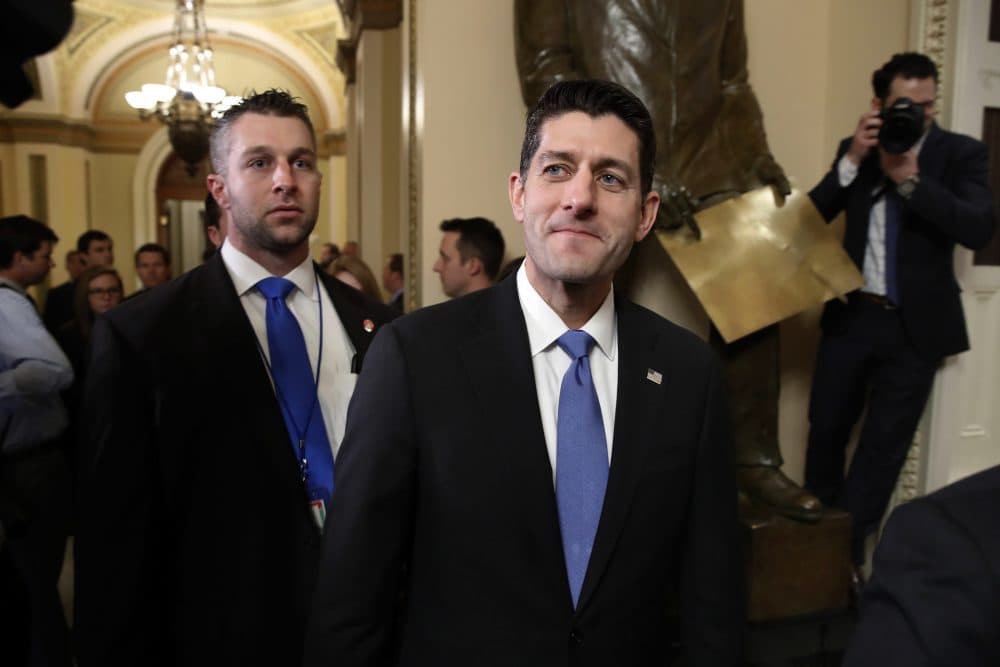Advertisement
Commentary
The GOP Passed Its Tax Bill. Now, We Must Look After Each Other

One of the oldest taboos in American life is talking openly about money. This kind of fiscal self-censorship transcends class and age. My friends and I — mostly Millennials — will often joke that even in 2017, it’s easier to talk about your kinkiest sex fantasies than your checking account balance. This taboo lingers because in American life, wealth conveys not just success, but character. Popular logic dictates that if you’ve got money in the bank, you’ve clearly worked hard, made wise decisions, and proven yourself a virtuous, enterprising American.
This mythology is part and parcel of the Republican tax bill, which lavishes money on the “virtuous” while punishing everyone else. Look no further than Sen. Chuck Grassley’s recent insinuation that those with next to nothing must be “spending every damn penny they have ... on booze or women or movies.” This comment illustrates why so many Americans can’t bring themselves to talk about financial hardship they’ve endured. Even if that hardship is the result of random misfortune or something more nefarious like wage-theft. America’s current social contract draws barely any distinction between routine laziness and rotten luck.
So today, as we approach Christmas — a holiday that celebrates generosity, kinship and love — I write to propose a new and informal social contract between those with means and those without.
America is heading straight into the cold and brutal territory of austerity -- 2018 will be one of the hardest years many of us will ever experience.
The raison d'etre for this entreaty to America is the Republican tax bill, which adds a staggering sum to the national debt. The GOP is openly planning to pay for a chunk of that debt by defunding essential taxpayer-funded safety net programs such as Medicare, Medicaid, CHIP and Social Security. Many of the people whose lives depend on those programs are going to die so that rich people, corporations and some Republican lawmakers can get a big tax break. Let’s get that right out in the open.
America is heading straight into the cold and brutal territory of austerity — 2018 will be one of the hardest years many of us will ever experience.
If you’ve lived fairly comfortably these past few years — if you’ve seldom had to sweat the matter of money — I guarantee you that at least three people in your network are privately suffering. These could be people whose occupations might suggest a cushier life. How do I know this? Because I’ve been one of those people.
My byline may appear in popular outlets like WBUR, but during the past five years as a freelance writer, I’ve been on MassHealth more than once and endured months with little to no income. I used to avoid revealing any of this because I worried it would compromise the professional and personal image I was trying to cultivate. But what finally encouraged me to speak up was a simple question that I would occasionally get from someone with relative privilege.
“How are you holding up?”
Consider the wording of that question. There’s no presumption of work or enterprise. The key inquiry is humanist. It’s a departure from the way that Americans often relate to each other — through their occupational endeavors. It’s an expression of compassion. It is a question that everyone lucky enough to not be gravely imperiled by the imminent wave of GOP-ordered austerity needs to start asking their friends, colleagues and family members on a regular basis.
And those of us who are suffering in solitude must find the courage to break the decades-long code of silence that has erased this kind of discourse from American life. Because silence during austerity is deadly. Not just for oneself, but for the fabric of communities. It discourages solidarity and it promotes delusional thinking: that mettle and spunk are enough for one person to overcome the very real and systemic dangers that countless Americans will soon find themselves facing.
This weekend, as millions of us celebrate a guy who was born to penniless parents in a loaned manger, take a moment to assess your situation honestly. Think about what you are prepared to ask for, or what you are able to give to others. If your job vanished tomorrow, whom would you turn to for work, food or shelter? If you’re a doctor, what would you be willing to do for a friend who just lost their health insurance?
Reckoning with these questions is how we make it to next November. The 2018 midterm elections are the ultimate do-or-die moment for repudiating the grotesque manner in which the GOP assembled and ratified this bill, with barely any regard for public sentiment or consequence. Those elections are an opportunity to re-stack Congress with lawmakers who will do everything they can to recapture the windfall of this tax scam for the benefit of the public.
But until then, we must commit to looking after each other with renewed honesty and urgency. As long as we do this, we will ensure that the humanity we honor on Dec. 24 each year prevails through the difficult year ahead and inspires a better kind of American politics.
A kind of politics that dispenses with myth, and lets love in.
